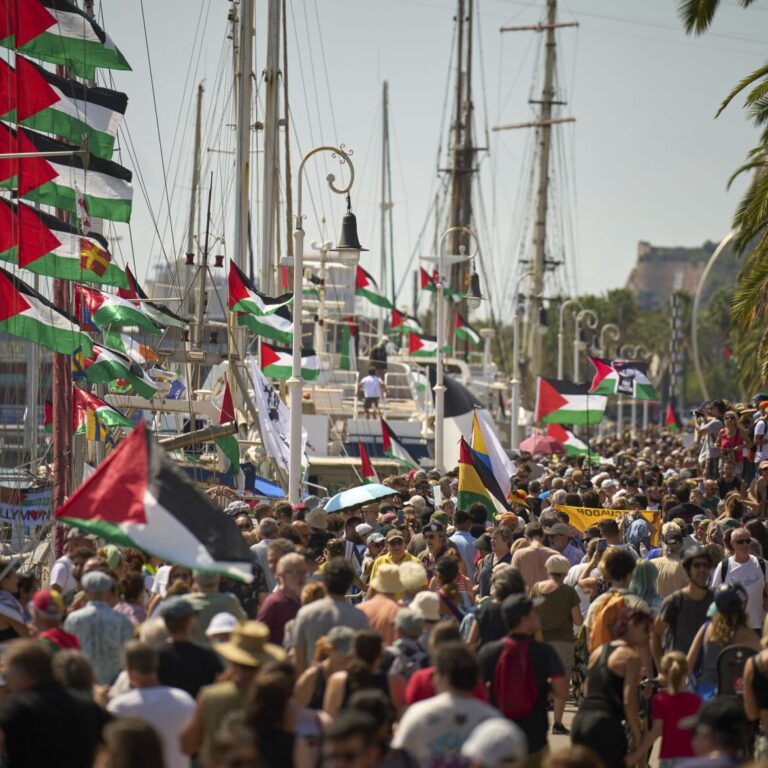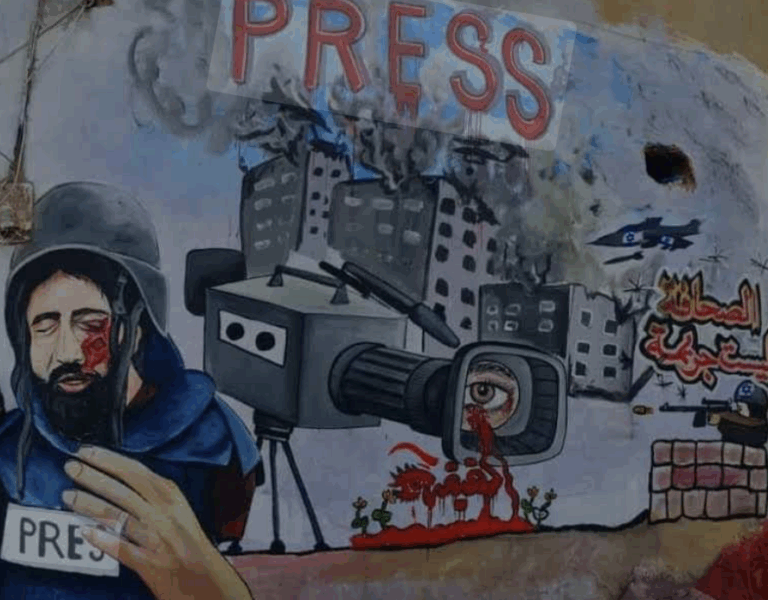By Andrea Tucci,
Dozens of small civilian boats carrying activists, parliamentarians, doctors, and trade unionists have already set sail from some European port, while others are preparing to depart in an effort to deliver humanitarian supplies to Gaza.
In July 2025, an international maritime initiative was launched: the Global Sumud Flotilla, made up of four major coalitions: the Global Campaign to Return to Palestine, the Freedom Flotilla Coalition, the Maghreb Sumud Convoy, and the Southeast Asian Nusantara Sumud Initiative.
More than 39 national delegations have confirmed their participation, making it the largest popular maritime effort in solidarity with Gaza since the Mavi Marmara in 2010 ( The Mavi Marmara, was a Turkish ship that was part of the Freedom Flotilla, was raided by the Israeli army in 2010, during which ten activists were killed).
This year, two of the Freedom Flotilla’s flagship boats, the Handala and the Madleen, which attempted to sail to break Gaza’s blockade, were attacked by drones and stormed by Israeli forces. Passengers were beaten, abducted, and deported.
According to international maritime law, civilian vessels carrying humanitarian aid in international waters are protected under the United Nations Convention on the Law of the Sea. Furthermore, Israel has maintained a land, air, and sea blockade on Gaza since 2007, constituting a violation of the Fourth Geneva Convention:
- Humanitarian Assistance (Art. 59): if the civilian population lacks sufficient resources, the occupying power must allow and facilitate the entry of aid from impartial organizations.
- Prohibition of Transfers and Deportations (Art. 49): both the forced displacement of the occupied population and the settlement of the occupier’s citizens are considered war crimes.
- Protection of Women and Children (Art. 76): minors must be given special protection, and women safeguarded against all forms of violence.
- Individual Criminal Responsibility: serious violations of the Convention—such as deliberate killings, torture, deportations, and unjustified denial of aid—constitute “grave breaches” and are prosecutable as war crimes before national or international courts, including the International Criminal Court (ICC).
None of these protections has ever been guaranteed to the Palestinian people.
In addition, the United Nations Convention on the Law of the Sea (UNCLOS) guarantees freedom of navigation in international waters. By seizing the Freedom Flotilla boats outside its territorial jurisdiction, Israel has committed an act tantamount to international piracy, which should be condemned as an unlawful international act, a violation of the freedom of the seas, or a war crime or act of aggression.
Instead of engaging through diplomacy or respecting humanitarian principles, Israel has resorted to force, treating peaceful civilian missions as military threats.
The Global Sumud Flotilla today represents the convergence of struggles across continents. Together, these networks have transformed a flotilla of boats into a people-led humanitarian corridor. Part of the mission has already set sail from Spain and Italy, with a second departure from Tunisia scheduled for September 4, with over 50 boats expected.
The pressing concern is that Israel will continue to attack peaceful ships in international waters, abduct activists, and suppress humanitarian efforts, while Western governments may keep looking the other way.
But ordinary people—from Greek and Italian dockworkers refusing to load weapons for Israel, to Tunisian unions welcoming the flotilla missions, to students and parliamentarians raising their voices—are building a counter-power.
Unfortunately in the 2011 during the mission Freedom Flotilla II, Greek authorities, partly under direct or indirect Israeli pressure, prevented ships from leaving Greek ports. Other boats that had already departed were intercepted and forced back to shore by armed coast guard intervention.
Also in 2024, the Freedom Flotilla mission was delayed because Israel exerted diplomatic pressure that triggered additional inspections. The United States, United Kingdom, and Germany reportedly pressured Turkey to prevent the fleet’s departure. Organizers also reported that, under Israeli pressure, some ship insurers withdrew their services, creating significant bureaucratic obstacles.
Israel’s strategy has been to enforce a preventive blockade, structured mainly through diplomatic and administrative pressures on departure states or companies involved, rather than through direct military interventions at ports. These practices have often prevented or distorted humanitarian missions even before the ships reached open sea.
Today, the ports involved in the Global Sumud Flotilla mission are in Italy, Tunisia, Spain, and Greece. It remains to be seen how these countries will respond to pressure from Israel and the United States. - Italy has historically been allied with Israel and the U.S., yet it also hosts strong pro-Palestine activism. It is unlikely that Rome will openly block departures from Sicilian ports, as this would certainly trigger a political scandal and popular unrest. More likely, under U.S.-Israeli pressure, Italy may increase administrative checks (harbormaster, customs, safety regulations) to slow or obstruct navigation. Politically, the government could “wash its hands” of the matter, framing it as a private initiative without official endorsement.
- Tunisia has shown strong popular and institutional support for the Palestinian cause, especially after October 7, 2023. It is unlikely Tunis will yield to Israeli/U.S. pressure. Instead, it will likely openly encourage the ships’ departure, using it as a domestic and international political message, potentially even providing diplomatic cover for the vessels.
- Spain, under the Sánchez government and progressive municipalities like Barcelona, is among the most critical of Israel in Europe. The flotilla’s departure from Barcelona has been presented as a political act of protest against the blockade, without giving in to Israeli or American pressure.
- Greece presents a more delicate case. In 2011, under strong Israeli and U.S. pressure, Athens blocked the Freedom Flotilla II in its ports. The Papandreou government at the time sought to strengthen ties with Israel and the U.S., but the decision sparked massive internal protests. Today, Greek public opinion is strongly supportive of the Palestinian cause, more so than in many other European countries. The recent incident where a cruise ship carrying 1,600 Israelis was denied disembarkation highlights rising anti-Israeli protests. Tensions in Cyprus (Greek side), where Israeli companies have purchased land and developed gated compounds almost inaccessible to non-Israelis, have further fueled distrust and resentment. Thus, while today’s Greek government does not wish to break with the U.S. and Israel, it must reckon with internal sensitivities or risk public uprisings.
The Global Sumud Flotilla clearly marks a new phase to build a transnational infrastructure of resistance.
In Arabic Sumud means Steadfastness, Resistance, Tenacity, which reflects both Palestinian resilience and the determination of peoples worldwide to act where European governments have already failed—remaining silent when the victims are Palestinians and their supporters.



